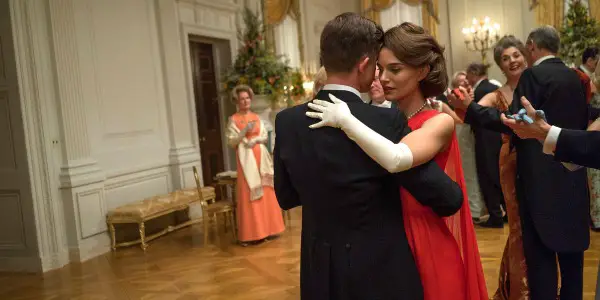JACKIE: A Timely Examination Of Public Perception

Jay is just a dude who takes in an unhealthy…
Perception is everything. I somehow doubt Taylor Swift is squeaky clean. It is incredibly clear that Kim Kardashian is hyperaware of the way people think of her. In modern times, this is an incredibly cynical concept. Fame is coveted above all else, and people are willing to be as disingenuous as they can possibly be to attain it. However, in a past world where media was not as all-encompassing as it is today, there were a few pillars of culture that needed to remain strong in order to keep the people, at large, at peace. In a media culture with five TV channels, everything you saw meant exponentially more than it does today.
I can (and do) choose to ignore the antics of whoever the current Bachelor is, and refuse to indulge in the shenanigans of the Real Housewives. The pseudo-celebrities of today act as a shield to the true influencers of the world. You don’t like the current president? Watch E! to take your mind off of things. Local news is bringing down? Here’s Tom Cruise smashing eggs on his head with an overly-exuberant late night host (no one specific, though, ya know?).
Jackie shows that the film’s namesake had human problems, but also a superhuman ability to rise above her own issues in the name of those who looked to her for strength and guidance. Over the course of history, this film will probably only be known to the masses because of the performance of Natalie Portman. This is sad, not because Portman isn’t great (she is), but because the film is an extremely timely examination of public perception and how the public sees the rich, famous, and influential as something beyond human.
Dramatic Reflection
In the wake of her husband’s assassination in 1963, the country was looking to Jackie Kennedy as a beacon of hope and stability. In reality, she was destroyed. Her private life was hard enough before her husband was murdered, but it took all of her inner-strength to be the symbol her country needed her to be. In Jackie, Pablo Larraín shows a side of Jackie O that seems mean-spirited at first, but that is only because we see her, in retrospect, as more of a deity than a human. She is an ideal that we strive to because of the way she was able to always compose herself in the eyes of the public.
The reality is that life sucks sometimes. It takes an extraordinary person to rise above it and be there for those who need him or her in a given moment. This is infinitely harder when, almost literally, every eye in the nation is on you. There was no time to truly mourn after Jackie’s husband’s brains were splattered in her lap and across her face. The film does a terrifically disciplined job of not using the assassination itself as an emotional crutch, as we only see it very briefly in the latter half of the film. Like us, Jackie is not allowed to let the events settle in.

The hinge that the story swings around is an interview that Jackie is having with Life magazine’s Theodore H. White, played by Billy Crudup. This framing device works perfectly, focusing on thematic ideas instead of spouting exposition. We hear Jackie express sometimes paranoid, sometimes profound ideas about what her “job” was following the tragedy in Dallas, and are transported to flashback after flashback establishing her thought process.
Jackie, like the rest of the best biopics, is a more of a memoir than a life-spanning biography. It captures a specific moment of this woman’s life and, more importantly, a specific moment in history. And this moment in history has become even more relevant today, as public artifice has become the perceived norm. A brilliantly put together recreation of Jackie’s tour of the White House for the American public emphasizes the broader themes of the film and were shot on period-specific cameras, adding to the authenticity of the film.
Showy But Meaningful
The most talked about element of the film will be Portman’s powerful performance. It will, at first, seem like an attention-grabbing piece of acting, but I beg every viewer to go and watch the aforementioned White House tour and be inevitably astounded by the authenticity of her accent and demeanor. As a reviewer who appreciates great performances, this is one to be proud of.
Portman’s role is one that is certainly a cry for attention, but she pulls it off with such aplomb that her intentions are irrelevant. To borrow a sports metaphor, sometimes it is nice to see Kobe Bryant decide to take over a game, forget about passing, and score 81 points. The greats sometimes have to remind everyone how great they are. Portman has a lot to make up for after the Star Wars prequels, after all.
Great performances aside, the uniqueness and ingeniousness of the score cannot be denied. This is a film that could have been directed and scored in an incredibly cheap and exploitative manner but was, instead, treated with care and subversiveness. Mica Levi’s score is so clearly the best score of the year, though it will not be acknowledged throughout award season because of its originality and genre-defiance. Music is an essential element of Jackie to a degree that not many other films can claim. It is because of Levi that the film feels like a horror/thriller in the body of a prestige biopic.

Levi’s score is one that transcends the medium of film and would fully satisfy the study habits of a music student who doesn’t have time to watch movies. It is complicated music that will challenge you even as you listen to it passively. It is stressful and anxious, antagonizing and guilt-ridden, and the walls feel as though they are closing in throughout the entirety of the film.
Jackie begins to question much more than her role as an American symbol in the aftermath of JFK’s death. We are treated to several great scenes where she talks to a priest (played as brilliantly as you would expect by the late John Hurt), about nothing more than existential jargon, but it works incredibly well. It may be off-putting for some, as it is essentially an exhibitionist endeavor that combines the showiest elements of just about every facet of filmmaking, but it is a fascinating collection of talents that adds a sense of definition to the film.
Conclusion
Jackie is a film about mythology and perception. It is methodical, patient, and careful. Director Pablo Larraín does a terrific job of reenacting the film techniques of the past in order to show how Jackie Kennedy tried to live the life of Leave It To Beaver, while reality wanted her to crumble underneath the drama and grief. Jackie is a woman who has become an ideal, and continues to provide hope to a large group of Americans. I, even as a younger person with no personal attachment to anything before the year 1991, was originally mad at the film for showing Jackie in a melodramatic, insincere light.
The reality is that Jackie, like the rest of us, was prone to being torn apart by events out of her control. In a world where politicians and figureheads are appealing to one side, it is incredibly promising to see a woman who was able to transcend her personal despair. She became a beacon of hope for the constituents that needed her, and acted as a figurehead of strength and perseverance. You feel, at once, sorry for her and proud of her unique ability to extend beyond the personal events of her life. The great performance of Natalie Portman, the incredible score by Mica Levi, and the direction of Pablo Larraín combine for an incredibly relevant reflection on modern celebrity culture.
What did you think of Jackie?
Jackie is currently in theaters in the US and the UK. For all international release dates, click here.
Does content like this matter to you?
Become a Member and support film journalism. Unlock access to all of Film Inquiry`s great articles. Join a community of like-minded readers who are passionate about cinema - get access to our private members Network, give back to independent filmmakers, and more.
Jay is just a dude who takes in an unhealthy amount of media of all types. Currently living in Atlanta, Georgia, he firmly believes that all movie theaters should have leather recliners, you eat popcorn too loudly, and if you don't put that cellphone away in 2 seconds you will learn the definition of frontier justice.













